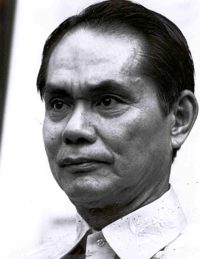I was concerned for Justice Barrera’s safety. When he saw me, he also showed much concern—for me. He asked excitedly in rapid succession, “Were you released?” Did they release you?”
“I was never taken in, Justice,” I assured him.
“No, no, no, you were taken in, but did they release you immediately afterwards?”
He showed genuine pleasure upon having been convinced that I had not really been arrested. And I said, “How about you, Justice, what’s your story? I was equally concerned about you. I thought you had gone to Hong Kong.”
“No.” He smiled. “It seemed actually I was in the list but it was Secretary Enrile himself who withheld my name saying that I am already quite an old man and there is nothing to be gained in putting me behind prison.”
“As a matter of fact,” he continued, “I had even prepared everything already, including my mosquito net, because I really thought I was going in.”
I proceeded afterwards to the meeting of the Committee on External Affairs.
“By the way, my name is not Ramon,” I said repeatedly because there was so much joking about the Con-con delegate Ramon Espiritu who, according to the papers, has been arrested.
Ramon Espiritu is one of the members of the Communist politburo in the Philippines who were arrested in 1956 and put behind bars for more than 15 years. I do not know him and I have never met him. I wonder why people like Ramon Espiritu, and even more so, Luis Taruc and Alfredo Saulo, who have already been punished so much in the past and who, apparently, are now living within the pale of the law, are to be detained again.
Nene Pimentel rode with me in the car. He told me that he was with Ernie Rondon a week ago when Rondon was taken in. They were apparently having lunch at Rondon’s house when an officer came in and showed him a xerox copy of an order from Enrile to have him arrested.
Pimentel had appeared at the Supreme Court yesterday.
“It was quite beautiful the way the thing had proceeded.” He was almost ecstatic. He had told the judges point-blank that if the Supreme Court did not do its duty now, they may find themselves in the same predicament as Chief Justice Taney in Ex Parte Merryman during the U.S. civil war. Taney had pitifully bewailed the illegality of Lincoln’s suspension of the writ of habeas corpus and his (Taney’s) own inability to release those arrested.
He said that the conditions did not warrant the declaration of martial law. To begin with, the bombings could not be used as an excuse. For example, Pimentel warmed up, who were caught after the grenade bombing of Plaza Miranda a year ago? There were some convicts among them, but there was absolutely no proof that the NPAs have really done it.
Again, who bombed Joe’s store at Carriedo? A PC trooper, not NPAs. Who was suspected of bombing the Con-Con? Two men dressed in PC uniforms were seen running away; in fact, it was probably because he was yelling and telling everyone that he saw two soldiers coming out of the toilet (which was the epicenter of the bombing) that Pepito Nolledo was later arrested.
Nene told the Supreme Court that it was their historic duty to do something to avert disaster. He apologized for speaking that way, but he was before a court of justice and if he could not speak there, he would not be able to speak anywhere else.
Nene said that he had discerned from the interrogations that Chief Justice Concepcion and Justices Fernando and Teehankee and possibly Fred Ruiz Castro were probably sympathetic.
It’s too bad, I said, that JBL Reyes is no longer in the Supreme Court.
According to him, the responses to the interrogation of the solicitor general, Titong Mendoza by Chief Justice Roberto Concepcion, showed that Titong himself was quite skeptical about the government’s actions.
The CEPO meeting I attended afterwards was held at the Army & Navy Club. When Tavi Tavanlar came in, he informed us that there was a think tank that was helping President Marcos formulate economic policies. Among the regular members that he had seen in these meetings of the group were Armand Fabella, Gerry Sicat, Ting Paterno, Bong Tanco and a few other guys. Tavanlar suggested that CEPO should formulate certain economic policies for presentation to this think tank.
What? Actively collaborate with the man primarily responsible for the loss of our freedoms—and the arbitrary arrests and even tortures? What a preposterous idea!
